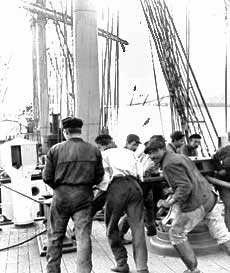adam's dana paper. skeet, skeet, skeet
a note to the reader: i'm almost done. i think i'm going to conclude it in a paragraph or twelve. when i started writing i was listening to Beck's album Odelay but after the song "Where It's At" i switched to his album Midnight Vultures. i'm telling you this because i figure there is a pretty good chance that his music has psychically found it's way into writing. just thought you should know...
Adam Hutchison
Working The Waters
"I know of no more encouraging fact than the unquestionable ability of man to elevate his life by a conscious endeavor. It is something to be able to paint a particular picture, or to carve a statue, and so to make a few objects beautiful; but it is far more glorious to carve and paint the very atmosphere and medium through which we look, which morally we can do. To affect the quality of the day, that is the highest of arts." Walden by Henry David Thoreau
In Two Years Before the Mast, Richard Henry Dana, Jr. presents himself as an outsider in the sailing community. He was not only an outsider, he was an intellectual surrounded by people who were not. This divide allowed for an extraordinary view of the culture of a ship. His ability to eloquently report on the duties of a 19th century seaman cut the romance out of the brutal work they were doing. His narrative led to a greater understanding and appreciation of what it meant to be a maritime laborer. His work has stood the test of time and like Thoreau wrote, his "conscious endeavor" made an indelible mark in the history of American literature.
Dana's stated goal of this work was "to give an accurate and authentic narrative of a little more than two years spent as a common sailor, before the mast, in the American merchant service" (4). His ability to participate in the goings-on aboard the ship while providing analysis of that work was revolutionary. For the first time, we, as landlubbers, could see the world through the eyes of Jack Tar while also understanding the intricacies of the ships hierarchy and culture.
It is interesting that Dana would choose life at sea aboard a merchant ship as a cure for his poor eyesight. He was Harvard educated and it would seem that though he didn't have the kind of money that some of his schoolmates did, he did have other options than to commit to being a common tar. This shows his resolve. He was educated but that didn't make him soft. He wanted to live fully - to know himself, to have his eyes opened (literally and figuratively). The sea provided him with that opportunity. The sea would tear away everything he knew about himself and provide a kind of education that Harvard could not. Even his second mate knew and made clear the difference in scenery: "‘Well Dana,' said the second mate to me, ‘this does not look much like Cambridge college, does it?" (65).
Though more educated than all other Tars, and probably most of the officers, Dana befriends several of the crew who were nowhere near as intelligent as him. He debates with the cook about the truth of a common superstition aboard the ship and even consents to refer to "John, the oldest, and at the same time the most ignorant man on the ship" (43) to settle the debate. Although he is hardly convinced, he does his best to listen to them. In the end, the cook downplays Dana's college education and states, "You wait till you've been to sea as long as I have, and you'll know" (44). Clearly the cook knows of the education the sea provides.
Dana's friendship with Nicholas was different in a lot of respects compared to that of the cook. Nicholas, though not at all intelligent in the academic sense, respected Dana's academic background and Dana was able to capitalize from their relationship. Nicholas was a massive man with a small intellect: "strong as an ox, and ignorant as strong" (157). He inspired fear in the officers and by Dana befriending him the officers avoided him as well.
For an educated man
"Theres nothing for jack to do but to obey orders"

